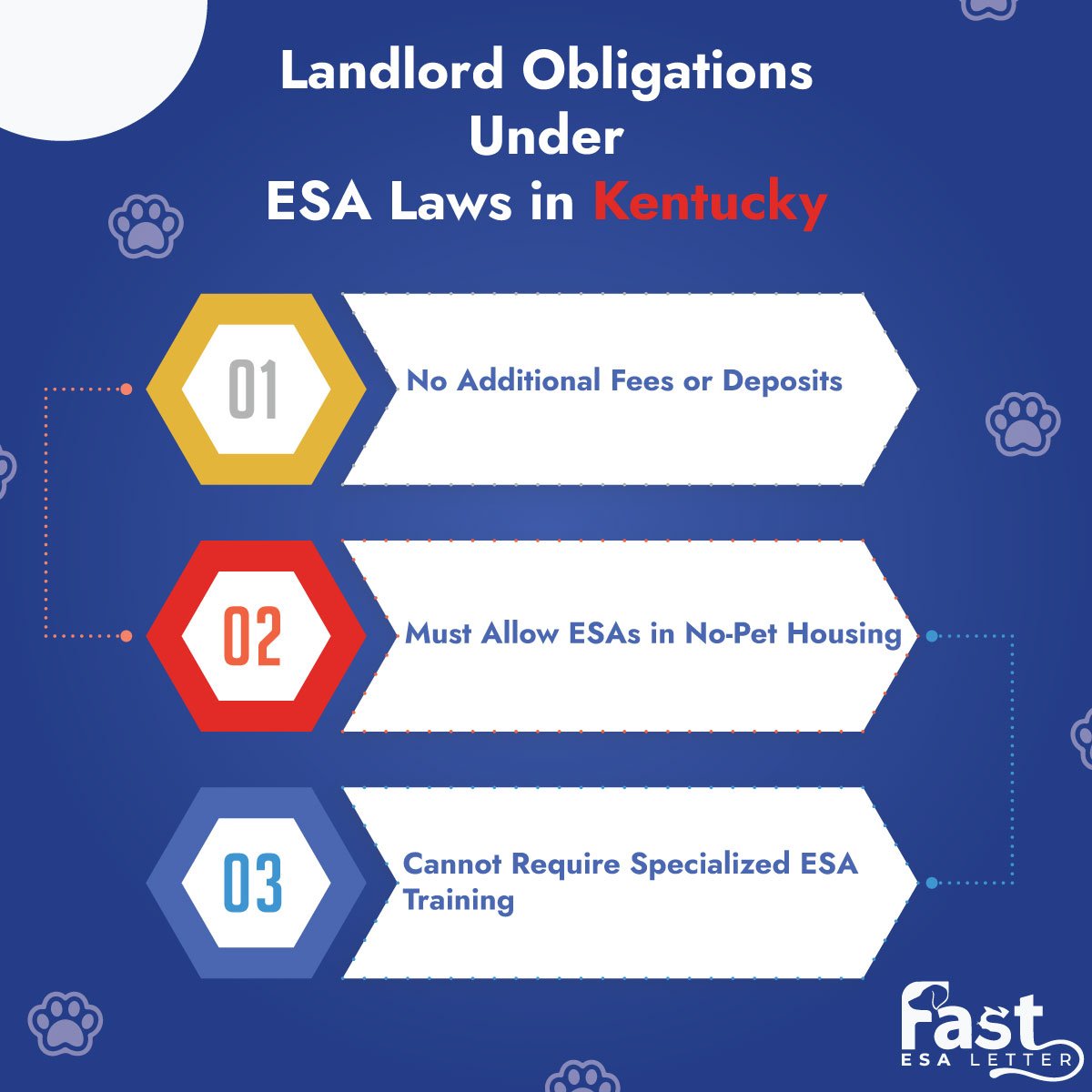What Are Emotional Support Animal Laws in Kentucky?

Robert Clendenin, MD
The truth is, that ESA laws in Kentucky protect both you and your emotional support animal, ensuring you have the right to secure housing without discrimination. This guide will break down Kentucky ESA laws, giving you the knowledge and confidence to find a home where you and your ESA truly belong.

Key Points
- Kentucky’s emotional support animal laws protect individuals with disabilities in housing but do not cover public access.
- ESA laws in Kentucky fall under the Fair Housing Act (FHA), ensuring reasonable accommodation for emotional support animals.
- Kentucky ESA laws do not require emotional support animals to be specially trained.
- An ESA letter from a licensed mental health professional is required to qualify for protection under Kentucky’s emotional support animal law.
Can You Live With Your Emotional Support Animal In Kentucky?
Under emotional support animal laws in Kentucky, tenants with an ESA have the right to live in rental housing, even if the property has a strict no-pets policy. Thanks to the Fair Housing Act (FHA), landlords are legally required to provide reasonable accommodation for individuals with emotional support animals without imposing additional pet fees or breed restrictions.
Landlord Obligations Under ESA Laws in Kentucky

- No Additional Fees or Deposits: A landlord cannot charge pet fees, deposits, or extra rent for an emotional support animal. Unlike standard pets, ESAs are recognized as assistance animals, meaning they are exempt from pet-related charges.
- Must Allow ESAs in No-Pet Housing: Even if a rental property enforces a no-pets policy, landlords must allow tenants to live with their emotional support animal as long as they meet the legal qualifications under ESA laws in Kentucky.
- Cannot Require Specialized ESA Training: Unlike service animals, emotional support animals do not require specific training to qualify for housing protections. A landlord cannot demand training certificates or force an ESA to meet specific behavioral standards beyond reasonable expectations.
When Can a Landlord Deny an ESA?
- If the ESA poses a direct threat to the safety of other residents (e.g., showing aggressive behavior).
- If the ESA has a history of causing significant property damage beyond normal wear and tear.
- If allowing the ESA would impose an undue financial or administrative burden on the landlord.
Can You Bring an ESA to Work in Kentucky?
Employers in Kentucky are not legally required to allow emotional support animals (ESAs) in the workplace, but they may choose to do so at their discretion. Several factors can influence an employer’s decision, including:
- The nature of the work environment—low-risk office settings may be more accommodating than food service or healthcare facilities.
- The behavior and training of the ESA—well-trained, non-disruptive animals are more likely to be approved.
- Documentation from a licensed mental health professional (LMHP)—a letter confirming that the ESA is essential for managing an emotional disability may strengthen the request.
Can You Travel with Your Emotional Support Animal in Kentucky?
Air Travel With an ESA in Kentucky
Under the Air Carrier Access Act (ACAA), as of 2021, emotional support animals are no longer recognized as service animals and are instead classified as pets. This means that airline-specific pet policies, including size restrictions, carrier requirements, and applicable pet fees, will apply. Since regulations vary by airline, it is essential to check with your chosen carrier well in advance to understand their ESA policies before booking your flight.
Train Travel with an ESA in Kentucky
Bus Travel with an ESA in Kentucky
Can You Bring Your ESA To Kentucky Colleges And Universities?
Additionally, universities cannot charge pet fees for an ESA in student housing. However, students must present a valid ESA letter from a licensed mental health professional. While ESAs are permitted in student housing, they are not automatically allowed in classrooms, dining halls, or other campus buildings unless the university specifically permits them.
How Do You Qualify For Protection Under The Kentucky Esa Laws?
To be protected under Kentucky’s emotional support animal law, tenants must provide proper documentation verifying their need for an emotional support animal. This requires a Kentucky ESA letter from a licensed mental health professional (LMHP).
How to Get an ESA Letter in Kentucky?
In Kentucky, you can obtain an ESA letter either online or offline. While both methods hold equal legal validity, the online process is often more convenient and hassle-free—as long as the letter is issued by a legitimate provider like Fast ESA Letter.

- Consult a Licensed Professional: Schedule an appointment with a Kentucky-licensed mental health professional through a secure online portal or meet with a therapist, psychiatrist, or psychologist in person.
- Evaluation Process: If opting for an online consultation, the evaluation will typically take place via a video or audio call, depending on your preference. During this session, be open and honest about your emotional or mental health condition and how an ESA could help improve your well-being.
- Receiving the ESA Letter: If the licensed professional determines that you qualify for an ESA, they will issue an official ESA letter. For online applications, this letter is usually delivered via email, making the process quick and efficient.
What an ESA Letter Must Include?
A valid ESA letter from a licensed mental health professional (LMHP) should confirm that the emotional support animal provides essential therapeutic benefits, helping to alleviate symptoms of the tenant’s condition. It must include the LMHP’s name, credentials, license details, and contact information. Without this documentation, the tenant may not be protected under Kentucky’s emotional support animal laws.
Can You Bring Your Emotional Support Animal To Public Places In Kentucky?
- Columbia Steakhouse: Offers steak, seafood, and casual dining with outdoor seating where dogs are welcome.
- Charlie Brown’s Restaurant and Lounge: Serves classic pub fare like burgers and roast beef, with pet-friendly outdoor patio seating available in the summer.
- Against the Grain: A brewpub offering 15 craft beers on tap, welcoming dogs.
- Proud Mary BBQ: A casual barbecue joint with outdoor tables where pets are allowed.
- Blue Dog Bakery & Cafe: Known for its artisanal bread and pastries, this café provides outdoor seating for dog owners.
- Paseo: A pet-friendly spot located in Louisville’s Highlands neighborhood.
While these establishments are known to be pet-friendly, policies can change. It is advisable to contact them directly to confirm their current stance on accommodating Emotional Support Animals.
Conclusion
While ESAs do not have the same legal privileges as service animals, the Fair Housing Act (FHA) ensures that individuals with emotional support animals can live in rental properties without discrimination or additional fees.
By obtaining a legitimate ESA letter from a licensed mental health professional, you can access the legal protections necessary to keep your emotional support animal by your side.
Frequently Asked Questions
Can I Have Multiple Emotional Support Animals In Kentucky?
Do I Need To Register My Emotional Support Animal In Kentucky?
What Types Of Animals Qualify As Emotional Support Animals In Kentucky?
What Types Of Animals Qualify As Emotional Support Animals In Kentucky?
What Types Of Housing Are Exempt From ESA Protections Under The FHA?
Do I Have To Tell My Landlord I Have An ESA In Kentucky?
Can A Landlord In Kentucky Charge A Fee For An Emotional Support Animal?
What Restrictions Can My Landlord Place On My Emotional Support Animal In Kentucky?
Does My Emotional Support Animal Need To Wear A Vest In Kentucky?
How Do You Qualify For An Emotional Support Animal In Kentucky?
Are Dogs Allowed In Restaurants In Kentucky?
Post Author
Patricia Thompson
Related Articles
What Are the Emotional Support Animal Laws in Kansas?
What Are the Emotional Support Animal Laws in Kansas?In Kansas, emotional support animals (ESAs) are protected under federal laws like the Fair Housing Act, which allows them in housing without pet fees, even in no-pet policies. However, ESAs are not...
What Are the Emotional Support Animal Laws in Nebraska?
What Are the Emotional Support Animal Laws in Nebraska?In Nebraska, emotional support animals (ESAs) are protected under federal laws like the Fair Housing Act, which allows them in housing without pet fees, even in no-pet policies. However, ESAs are...
What Are the Emotional Support Animal Laws in Wyoming?
What Are the Emotional Support Animal Laws in Wyoming?In Wyoming, emotional support animals (ESAs) are protected under federal laws like the Fair Housing Act, which allows them in housing without pet fees, even in no-pet policies. However, ESAs are...
Live Free with Your ESA!
An ESA Letter Unlocks Freedom!






